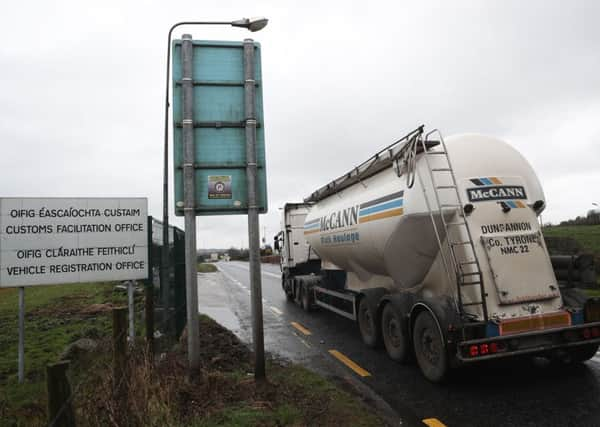Regardless of any trade deal with the EU, border checks will still be needed


Although this has been set as a clear intention by the UK government, there is still far too much ambiguity about what it might mean.
Before we begin to consider what the best deal might look like for Northern Ireland, therefore, we must get a few things straight about borders and border controls.
Advertisement
Hide AdAdvertisement
Hide AdFirst, there is simply no option for the UK to ‘choose’ not to have a hard border.


Borders are, of course, not merely a domestic concern but a two-sided, international matter. The only way the UK government can ‘guarantee’ that there will be no hard border is to find arrangements that avert the conditions that create such a border in the first place.
These arrangements will need to comply with the rules of the World Trade Organisation (WTO). It is simply not in the gift of one country to decide whether or not to apply border controls.
Even more straightforwardly, basic good governance would lead us to expect that those in power would do their best to manage borders effectively. Customs controls protect citizens and consumers by working to collect duties for the Treasury, to counter smuggling and to prevent dangerous goods entering the country.
Advertisement
Hide AdAdvertisement
Hide AdWhen we think of countries in Europe’s neighbourhood with porous borders for drugs, people trafficking or arms, we don’t see that as them exercising their sovereign right to choose to avoid a hard border – we see it for what it is: a problem for our collective security.


So what is it about Brexit that makes the Irish border more significant? Well, the greater the difference in regulations and rules, duties and prices between two countries, the greater the incentive for smuggling. And such differences between the UK and Ireland look set to dramatically expand due to Brexit.
Let us be clear: a deep, comprehensive free trade agreement with the EU is not a solution to this challenge.
Even if there is ‘full alignment’ between the UK and EU regulations, border controls and checks will still be needed because the UK will be out of the customs union.
Advertisement
Hide AdAdvertisement
Hide AdAt the moment, common EU membership means that the UK and Ireland are part of the same single market and customs union, which not only means many of their regulations are harmonised, but also that they apply the same tariffs and have the same trade deals with many countries. Leaving the EU’s customs union without replacing it with something that does the same job will create costs, delays and paperwork to cross the border.


This is not ‘punishment’ by the EU; it is a requirement that will be enforced by the WTO.
Much has been made of the example of Norway, which is in the single market (via the EEA) but which is outside the customs union. This means goods crossing that border have to go through customs import/export processes.
Clearly, no one is ‘punishing’ Norway for anything; it’s just what a border is.
Advertisement
Hide AdAdvertisement
Hide AdCalling that ‘punishment’ is the equivalent of saying that having a front door on your house punishes visitors by making them knock.


The facts are unavoidable: now that the UK has determined that it is leaving the single market and customs union, firmer (if not harder) borders will arise as a result.
There is not a choice between a land border and a sea border per se, but some border controls will have to be in place at some points.
Where those points are and what those controls are for depends greatly on the terms of the withdrawal agreement.
Advertisement
Hide AdAdvertisement
Hide AdAnd we will not know the nature of those borders and controls until the final Free Trade Agreement is signed between the EU27 and the UK.
Such a treaty will not even begin to be formally negotiated until March 30, 2019.
The more complicated it is, the longer it will take to negotiate. And the final treaty will then have to be approved and ratified by each one of
the EU27 member states.
Now that the UK’s promise to avoid a hard border has been given some flesh in the Phase I report – and the central importance of aligning UK and EU rules acknowledged – we should start to look at this challenge in a pragmatic way.
Advertisement
Hide AdAdvertisement
Hide AdThe border issues arising through Brexit are a set of real-world legal and good governance challenges which need to be tackled with good faith and an eye to international laws and norms.
It is essential we begin by acknowledging why border controls may be needed, and by exploring the kind of arrangements it would take to make them unnecessary.
Katy Hayward is reader in sociology at Queen’s University Belfast; Paul McGrade is a former diplomat and a consultant on EU public affairs